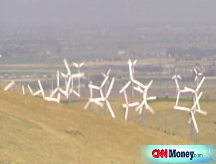Oil falls on economic uncertainty
Crude prices give up earlier gains to end 74 cents lower as investors battle over whether economic recovery can overcome increased supply.
NEW YORK (CNNMoney.com) -- Oil ended lower in a volatile trading session Monday as investors mulled oversupply against hopes that the battered economy may be showing signs of recovery.
U.S. crude for March delivery traded down 74 cents to $45.73 a barrel on Monday, but not before hitting a trading high of $48.59 earlier as investors expressed a limited measure of optimism. Oil traded as low as $45.25 during the session.
"The market is now trying to decide if there's going to be enough economic activity to work off the oversupply of oil," said Phil Flynn, senior energy analyst with Alaron Trading in Chicago.
Also pressuring oil lower were stocks, which gave up earlier gains to turn lower in the afternoon, and the dollar, which tumbled against the euro and the British pound.
Investors often look to stocks for an immediate gauge on the health of the economy and over the past several trading sessions, any movement in stocks has led to corresponding moves in oil prices. And oil, like other commodities, is traded in dollars, so weakness in the U.S. currency can spur buying by foreign investors because it becomes cheaper from their perspective.
"It's getting harder and harder for oil to stay up without support from other markets," Flynn said.
Where's the demand? On the economic front, reports were mixed, with strength in housing being offset by massive layoff announcements. And the markets need more signs of good news before the supply glut gets worked off.
Sales of existing homes in December rose an unexpected 6.5% for the month, according to the National Association of Realtors. And the index of leading economic indicators from the Conference Board rose 0.3%. Analysts had expected a decline.
However, Monday was also a dismal day for the labor market as employers, including Home Depot, Caterpillar and Sprint among others, announced over 50,000 job cuts.
Oil supplies in the U.S. have gone up significantly in the past several weeks. Last week the Energy Department reported that supplies of crude increased by 6.1 million barrels in the week ended Jan. 16. Analysts had only been expecting an increase of 1.9 million barrels, according to energy research firm Platts.
"Oil has an incredible hurdle to get over," said Flynn.
Investors are caught between trying to trade oil lower because of the current glut of supply, and trying to trade oil higher on perceptions that the economy could be improved, when these oil contracts are actually delivered, he said.
Weighing OPEC cuts: Investors were also conflicted over whether or not the Organization of Petroleum Exporting Countries would be able to cut production enough to keep up with the decline in demand caused by the waning economy, said James Williams, energy economist with WTRG Economics in London, Ark.
"We are between two things that are very uncertain," said Williams.
When demand will resume is unknown because of the ongoing economic uncertainty and it's unclear whether OPEC, which produces about 40% of the world's oil, will meet its pledge to cut output by 2.2 million barrels a day this month, he explained.
Stimulus hope: Over the past week, investors have expressed optimism about the new government's push for a multi-billion-dollar stimulus plan.
In order to tackle the growing economic problem, the Obama administration has been advocating an economic stimulus package valued at about $825 billion. Last week the administration said the plan was just one part of a three-pronged approach to revitalize the nation.
Meanwhile the price of gasoline fell 0.3 cent to a national average of $1.842 a gallon at the pump, according to a daily survey by motorist group AAA. ![]()




